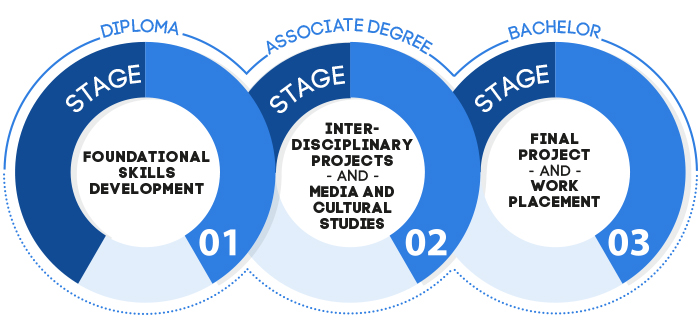Minimum Age
If a career in audio is music to your ears, you're going to love the sound of our internationally accredited bachelor degree. It's an immersive, hands-on experience that covers every possible level of studio-, post- and live production.
At SAE you won’t find yourself in a lecture with 300 people or even in a traditional lecture at all. You’ll be in a studio environment amplifying your talents using cutting-edge equipment like Neve, SSL, or an Audient console, while gaining proficiencies on software including Pro Tools, Logic Pro X, and Ableton Live.
Your growth and development will be assessed through the completion of industry-based projects, not theoretically based essays. This will ultimately help you build up a body of work and portfolio to share with potential employers or first client.
In preparation for an industry that commands agility and adaptability, you’ll cut your creative teeth on projects initially in partnership with your course peers. As your skills develop and you work on more dynamic projects, you’ll apply your capabilities on cross-discipline projects. By the end of your course, you could be collaborating with fellow students across SAE’s global network.
Ultimately, this is all about a qualification that will expand your career. There is work placement as part of your course, to provide practical experience and help build your network. We’ll also equip you with employability skills, giving you professional strategies in communication and self-promotion.
For those wanting to go the extra, and thousands of miles, you can complete up to two trimesters of your course at selected SAE campuses across the planet. Suddenly, the real-world experience just went worldwide.
Once complete, you’ll have just what you need to mix it with the best.
The Audio degree program is broken up into discrete stages, each designed to promote different skills.
Stage I – Foundational Skills Development
In Stage I, students will undertake a number of foundational units which will give students the essential technical skills and knowledge not only relevant to the chosen discipline area, but also give students the skills required to collaborate with other creative media students and professionals in later stages of the Audio course.
Stage II – Interdisciplinary Projects, Media and Cultural Studies
In Stage II we show students how their Audio work contributes to and interacts with broader culture and media practice. This knowledge will enable students to work with a variety of other disciplines and artists and expand their potential on the global stage.
Students complete a number of real-world projects with students not only in their own discipline, but also in all other SAE disciplines.
Stage II has three studio modules with projects based on the following areas;
1. Studio Production
Students wishing to extend their studio production skills will work on large-scale commercial audio desks in both analogue and digital format from both audio engineering and music producing roles, acoustics, outboard effects and microphones. Develop a complete understanding of the sound aesthetic from a technological level to a production level and use your skills to mix and master tracks from recording through to the final product.
In addition to large consoles, you will use a variety of equipment found in current audio industry practice, including in-the-box systems and cutting edge hardware and software controller technology to achieve the same outcomes expected in traditional studio environments.
2. Post Production
Students with a post-production focus will incorporate audio with the moving image. This includes audio for film, games and animation with creation and manipulation of the entire sonic environment of multimedia.
Explore location audio using various microphone techniques for ambient sounds as well as dialogue and sound effects. Develop skills in automatic dialogue replacement (ADR), Foley and sound design.
Students will look deeper into the aesthetics of literal and non-literal sound and the techniques of mixing for immersive sound formats and environments.
Stage III
Stage III is the final part of study. Here you will undertake an interdisciplinary project of choice to be the final and most ambitious portfolio Audio project that a student will undertake.
Students will also finalise their studies by undertaking an Audio elective module and completing a compulsory internship.


